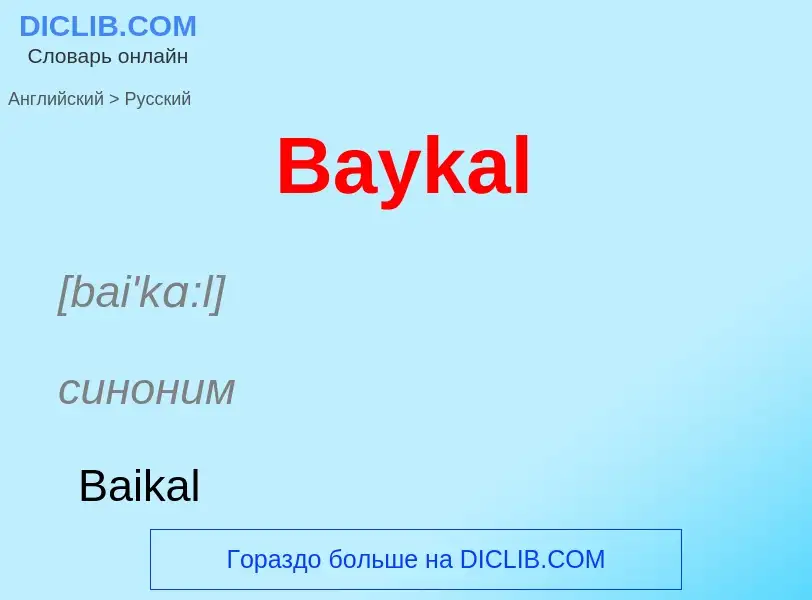Перевод и анализ слов искусственным интеллектом ChatGPT
На этой странице Вы можете получить подробный анализ слова или словосочетания, произведенный с помощью лучшей на сегодняшний день технологии искусственного интеллекта:
- как употребляется слово
- частота употребления
- используется оно чаще в устной или письменной речи
- варианты перевода слова
- примеры употребления (несколько фраз с переводом)
- этимология
Baykal - перевод на русский
[bai'kɑ:l]
синоним
[bai'kɑ:l]
существительное
общая лексика
оз. Байкал
география
(озеро) Байкал
Смотрите также
Википедия

Lake Baikal (, Russian: Oзеро Байкал, romanized: Ozero Baykal [ˈozʲɪrə bɐjˈkaɫ]) is a rift lake in Russia. It is situated in southern Siberia, between the federal subjects of Irkutsk Oblast to the northwest and the Republic of Buryatia to the southeast. With 23,615.39 km3 (5,670 cu mi) of water, Lake Baikal is the world's largest freshwater lake by volume, containing 22–23% of the world's fresh surface water, more than all of the North American Great Lakes combined. It is also the world's deepest lake, with a maximum depth of 1,642 metres (5,387 feet; 898 fathoms), and the world's oldest lake, at 25–30 million years. At 31,722 km2 (12,248 sq mi)—slightly larger than Belgium—Lake Baikal is the world's seventh-largest lake by surface area. It is among the world's clearest lakes.
Lake Baikal is home to thousands of species of plants and animals, many of them endemic to the region. It is also home to Buryat tribes, who raise goats, camels, cattle, sheep, and horses on the eastern side of the lake, where the mean temperature varies from a winter minimum of −19 °C (−2 °F) to a summer maximum of 14 °C (57 °F). The region to the east of Lake Baikal is referred to as Transbaikalia or as the Transbaikal, and the loosely defined region around the lake itself is sometimes known as Baikalia. UNESCO declared Baikal a World Heritage Site in 1996.


![A "giant" ''Brachyuropus reicherti'' ([[Acanthogammaridae]]) amphipod caught during [[ice fishing]] in the lake. Red-orange is its natural, living coloration A "giant" ''Brachyuropus reicherti'' ([[Acanthogammaridae]]) amphipod caught during [[ice fishing]] in the lake. Red-orange is its natural, living coloration](https://commons.wikimedia.org/wiki/Special:FilePath/Baikal-Flohkrebs.jpg?width=200)
![The [[Baikal seal]] is endemic to Lake Baikal. The [[Baikal seal]] is endemic to Lake Baikal.](https://commons.wikimedia.org/wiki/Special:FilePath/Baikal-seal 4747-pho.jpg?width=200)



![A [[digital elevation model]] of Lake Baikal region A [[digital elevation model]] of Lake Baikal region](https://commons.wikimedia.org/wiki/Special:FilePath/DEM Baikal lake.png?width=200)

.jpg?width=200)
![[[Great Baikal Trail]] goes from Listvyanka to Bolshoe Goloustnoye along Lake Baikal coast [[Great Baikal Trail]] goes from Listvyanka to Bolshoe Goloustnoye along Lake Baikal coast](https://commons.wikimedia.org/wiki/Special:FilePath/Great-baikal-trail.jpg?width=200)

![Museum specimen of the branching sponge ''[[Lubomirskia baicalensis]]'' (living are brighter green) Museum specimen of the branching sponge ''[[Lubomirskia baicalensis]]'' (living are brighter green)](https://commons.wikimedia.org/wiki/Special:FilePath/Lubomirskia-baicalensis.jpg?width=200)


![The [[Yenisey]] basin, which includes Lake Baikal The [[Yenisey]] basin, which includes Lake Baikal](https://commons.wikimedia.org/wiki/Special:FilePath/Yeniseirivermap.png?width=200)


![Frozen lake Baikal near [[Olkhon Island]] Frozen lake Baikal near [[Olkhon Island]]](https://commons.wikimedia.org/wiki/Special:FilePath/Lake Baikal in winter.jpg?width=200)

![A sandy beach in the [[Kabansky District]] A sandy beach in the [[Kabansky District]]](https://commons.wikimedia.org/wiki/Special:FilePath/Побережье Байкала в Сухой.jpg?width=200)
![Svyatoy Nos Peninsula]], [[Zabaykalsky National Park]] Svyatoy Nos Peninsula]], [[Zabaykalsky National Park]]](https://commons.wikimedia.org/wiki/Special:FilePath/26 swiatoinos.jpg?width=200)
![Lake Baikal as seen from the [[OrbView-2]] satellite Lake Baikal as seen from the [[OrbView-2]] satellite](https://commons.wikimedia.org/wiki/Special:FilePath/Baikal-S1999276045323.png?width=200)

![abbr=on}} at the lake's southern tip, probably caused by [[convection]] abbr=on}} at the lake's southern tip, probably caused by [[convection]]](https://commons.wikimedia.org/wiki/Special:FilePath/Circles in Thin Ice, Lake Baikal, Russia.jpg?width=200)
![Delta of the [[Selenga River]], Baikal's main tributary Delta of the [[Selenga River]], Baikal's main tributary](https://commons.wikimedia.org/wiki/Special:FilePath/Selenga delta.jpg?width=200)
![Buryat]] [[shaman]] on [[Olkhon Island]] Buryat]] [[shaman]] on [[Olkhon Island]]](https://commons.wikimedia.org/wiki/Special:FilePath/Khagdaev 02.jpg?width=200)

![Steam locomotive on the [[Circum-Baikal Railroad]] Steam locomotive on the [[Circum-Baikal Railroad]]](https://commons.wikimedia.org/wiki/Special:FilePath/КБЖД 17.jpg?width=200)
![Ангара (ледокол)}}'' was launched in 1900 and is one of the oldest surviving [[icebreaker]]s Ангара (ледокол)}}'' was launched in 1900 and is one of the oldest surviving [[icebreaker]]s](https://commons.wikimedia.org/wiki/Special:FilePath/Ledokol Angara.jpg?width=200)
